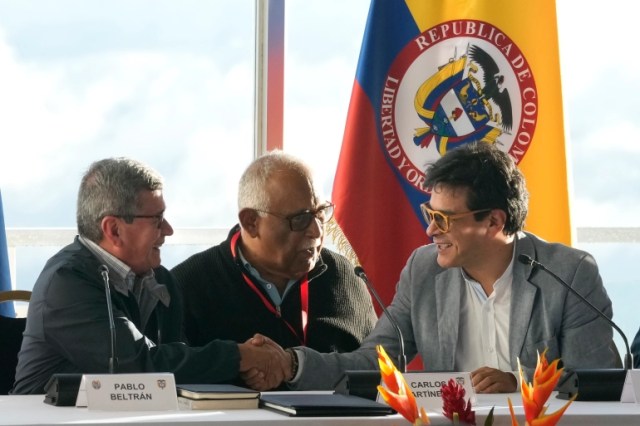
New left-wing president and former rebel Gustavo Petro pushed to resume dialogue to end 60 years of war.
By Aljazeera
Nov 22, 2022
The Colombian government and the left-wing National Liberation Army (ELN), the country’s largest remaining rebel group, launched new peace talks in neighbouring Venezuela aimed at ending nearly 60 years of conflict.
The push for the talks, which resumed on Monday after they were suspended in 2019, came from Colombia’s new first-ever left-wing President Gustavo Petro, who was a former member of the M-19 rebel movement.
Petro has pledged a less bellicose approach to ending the violence wrought by armed groups, including left-wing armed fighters and drug traffickers.
Dialogue begins in Venezuela
Representatives of ELN and Petro’s administration met in Venezuela, which restored diplomatic relations with Colombia in August after three years.
The delegates said they had gathered to restart a dialogue “with full political and ethical will, as demanded by the people of rural and urban territories that suffer from violence and exclusion, and other sectors of society”.
Both sides are willing to “build peace based on a democracy with justice”, they said in a joint declaration.
The first round will last 20 days, with diplomats from Venezuela, Cuba and Norway helping in the negotiations, while representatives from Chile and Spain will observe it.
Decades-long Colombia conflict
Colombia has suffered more than half a century of armed conflict between various groups of left-wing rebels, right-wing paramilitaries, drug traffickers and the government.
The ELN started in 1964 as a leftist ideological movement by students, union leaders and priests inspired by Cuba’s revolution.
The group is believed to have about 4,000 fighters in Colombia, and is also present in Venezuela, where it runs illegal gold mines and drug trafficking routes.
It is also known for staging kidnappings for ransom and attacks on oil infrastructure. The United States and the European Union have listed it as a “terrorist” organisation.
In 2016, a peace agreement disbanded the Marxist Revolutionary Armed Forces of Colombia, known as FARC, making ELN the largest remaining rebel group. It has since increased its activities in territories formerly under FARC control.
Under former President Juan Manuel Santos, FARC signed a peace treaty, subsequently abandoning its weapons and creating a political party.
In 2019, the peace talks with the ELN were called off by conservative former President Ivan Duque after a car bomb attack on a police academy in Bogota that killed 22 people.
Total peace for Petro
After winning the elections in August, Petro reached out to the ELN as part of his “total peace” policy.
The ELN delegation spent four years based in Cuba, as they had been barred from returning to Colombia by the previous government.
Colombian Defence Minister Ivan Velasquez, however, warned that the negotiations do not imply a “suspension of operations” against the ELN.
“If there is an encounter with someone who has an arrest warrant, they must be captured … There is no ceasefire,” he said.
Rebel group pledges ‘fundamental’ change
ELN leader Israel Ramírez Pineda said the group aims to make “fundamental changes”, as demanded by the Colombian people during enormous demonstrations in 2021 and in elections this year by choosing Petro, leaving behind the tradition of conservative and moderate governments.
“Colombians cannot see each other as enemies, the work we have is reconciliation,” Ramírez Pineda said.
“We hope that the government’s delegation will have an interlocutor in the same sense”.
He added that the rebels hope the United States takes a “proactive and supportive attitude” to the dialogue. The US for decades has supported Colombia’s armed forces.
…
Read More: Aljazeera – Colombian government, left-wing ELN rebels launch new peace talks
…

